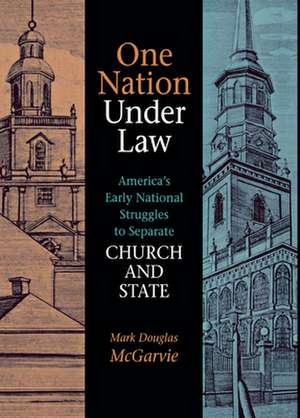One Nation under Law: America's Early National Struggles to Separate Church and State
Autor Mark Douglas McGarvieen Limba Engleză Paperback – 19 iun 2005
In this timely study, Mark McGarvie documents America's transition from Christian communitarianism with its government-sponsored religious institutions to liberal republicanism with its insistence that church and government not interfere with one another. Surprisingly, for a half-century after the ratification of the Constitution, many early state governments continued to support religious organizations. Disestablishment nonetheless proceeded, gaining ever greater momentum as churches lost tax support and found that they could not enforce mandatory attendance laws. No longer public institutions with strong state backing, churches were reconstructed as private, voluntary associations. At the same time, the state took responsibility for poor relief, community record keeping, and a variety of other public services formerly left to the churches.
Providing a close-up view of disestablishment as both a legal and an ideological process, McGarvie focuses on the efforts of three key states--New York, South Carolina, and New Hampshire--to disentangle church and state during the early national period. These case studies are particularly enlightening because a single state's disestablishment crisis helped change the law for the entire nation when New Hampshire's attempt to convert Dartmouth College into a secular state institution ended in a suit that eventually reached the Supreme Court. One Nation under Law is an important contribution to an ongoing, distinctly American debate.
| Toate formatele și edițiile | Preț | Express |
|---|---|---|
| Paperback (1) | 252.90 lei 6-8 săpt. | |
| Northern Illinois University Press – 19 iun 2005 | 252.90 lei 6-8 săpt. | |
| Hardback (1) | 720.26 lei 6-8 săpt. | |
| Northern Illinois University Press – 23 sep 2004 | 720.26 lei 6-8 săpt. |
Preț: 252.90 lei
Nou
Puncte Express: 379
Preț estimativ în valută:
48.41€ • 49.82$ • 40.81£
48.41€ • 49.82$ • 40.81£
Carte tipărită la comandă
Livrare economică 01-15 martie
Preluare comenzi: 021 569.72.76
Specificații
ISBN-13: 9780875806068
ISBN-10: 0875806066
Pagini: 268
Dimensiuni: 152 x 229 x 15 mm
Greutate: 0.4 kg
Ediția:1
Editura: Northern Illinois University Press
Colecția Northern Illinois University Press
ISBN-10: 0875806066
Pagini: 268
Dimensiuni: 152 x 229 x 15 mm
Greutate: 0.4 kg
Ediția:1
Editura: Northern Illinois University Press
Colecția Northern Illinois University Press
Descriere
In this book, the author traces the influence of religion in Lincoln's speeches and writings, showing how the president unified his strongly democratic politics with a religious moral vision.
Recenzii
"The most innovative recent study of church-state relations in the early republic."—Journal of the Early Republic
"Unique and valuable... subtle and sophiticated scholarship. For those who specialize in church-state issues in America, this book is essential reading. "—Journal of Church and State
"One of the best scholarly works in years to argue effectively for the separation of church and state as part of the founders''original intent.' McGarvie proves himself in this book to be a superb historian of law and the history of ideas."—The American Journal of Legal History
"Unique and valuable... subtle and sophiticated scholarship. For those who specialize in church-state issues in America, this book is essential reading. "—Journal of Church and State
"One of the best scholarly works in years to argue effectively for the separation of church and state as part of the founders''original intent.' McGarvie proves himself in this book to be a superb historian of law and the history of ideas."—The American Journal of Legal History
Notă biografică
Mark Douglas McGarvie, J.D., Ph.D., is Assistant Professor of History and Law at the University of Richmond.
Cuprins
Table of Contents
Illustrations
Acknowledgments
Introduction
1. Toleration versus Freedom
2. Revolutions in Churches and Society
3. "To Form a More Perfect Union"
4. God Is as Man Makes Him
5. Revolutionary-Era Disestablishment
6. Southern Republicanism and Constitutional-Era Disestablishment
7. The Dartmouth College Case
Conclusion
Notes
Bibliography
Index
Acknowledgments
Introduction
1. Toleration versus Freedom
2. Revolutions in Churches and Society
3. "To Form a More Perfect Union"
4. God Is as Man Makes Him
5. Revolutionary-Era Disestablishment
6. Southern Republicanism and Constitutional-Era Disestablishment
7. The Dartmouth College Case
Conclusion
Notes
Bibliography
Index








